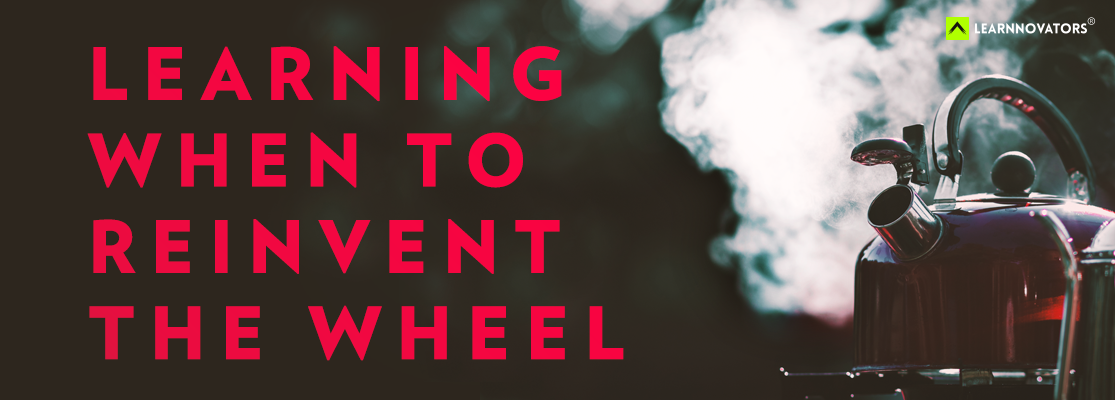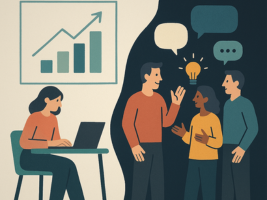I read a small news item a while back and I just can’t stop thinking about it. A bunch of researchers at MIT found a new, much more efficient way to boil water. It’s giving me goosebumps, no kidding. Let me share that awe with you…
While in the corporate world we regard wanting change to be almost a virtue in itself, we also readily resort to a rhetorical question I quite dislike. That is, “Why reinvent the wheel?” Mostly it’s a verbal shrug or retort when someone is trying to challenge an established way of doing something. A close cousin is of course, “if it ain’t broke don’t fix it”. Folksy wisdom.
(Cough. You may know, I’ve Emotions about folksy wisdom!)
Of course, in fairness, when these responses are given, they are given to assert that the established way works. So why reinvent the wheel? Why re-verify the seemingly obvious? Why put in the grunt work of figuring a solution from first principles? Why not take the easy, assured path to success? (…Anyone else starting to feel a bit twitchy?!)
And yet, these researchers apparently didn’t think that way. They did study how to boil water. I don’t know about their deliberations or reason for coming up with such a focus, so I won’t attempt to speculate but I will tell you, I find their attitude incredibly inspiring. And more than fangirl-ing, I want to share with you what this got me wondering about.
When is it worth reinventing the wheel?
I can immediately think of some logical circumstances:
- When what is there is a solution, not necessarily the solution.
- When the context, basic premises or assumptions of the problem or solution have changed (which can happen for so many reasons, including simply as a result of the passage of time)
- When there has been a foundational shift in knowledge, rendering the reasoning used in the solution obsolete, incorrect, sub-optimal, etc.
- When you see an opportunity for improvement or a different approach to solving the problem because of a breakthrough in technology, perhaps a shift in people dynamics, cultural changes, etc.
- When nobody has critically examined the solution (or the problem!) for a long time and the ‘formula’ has become dogma
- When you don’t know the solution (not the best reason, but it does happen)
- When you have a changed understanding of the circumstances in which the solution was ideated/created
- When you want to develop your understanding or appreciation of the known solution
These all seem very reasonable moments to examine if we must recreate or rethink the solution (maybe after considering what the impact or consequence might be of experimental or unassured outcomes) … But they’re all fairly passive, in that they’re reactive and don’t show enough drive for my liking. Do you know my absolutely favourite reason which isn’t up there because it’s admittedly not ‘logically warranted’?
“…Just ‘cos!” Curiosity is a brilliant reason why. And I’m not talking novice curiosity where it’s ignorance of basic principles, domain concepts, problem patterns and their solutions behind the urge; I’m talking of a more expert, experienced curiosity. We talk about ways of knowing and how they differ between an expert and a novice (and I do love that body of work) … but I think this is also an important trait of expertise: its irreverence towards what it itself knows! – Its willingness to kick at the tyres every now and then. That’s golden.
I know, the immediate challenge is going to be how do we demarcate like that in real life when one is exhibiting novice curiosity as opposed to expert curiosity when attempting to reinvent the wheel without any logical trigger. Frankly, I don’t have a ready, slick answer for that.
My thinking is, perhaps the starting condition will give a clue: are we proficient, expert practitioners? If we can do the known stuff expertly, perhaps that’s a good (even if not conclusive) indicator that the curiosity also comes from an expert than novice position. What’s your take?
While we mull on it… let’s raise a glass of boiled water and toast those researchers for boiling water in exciting, new ways that got us thinking even in distant fields!
Written by Mridula R., Principal Learning Consultant @ Learnnovators






